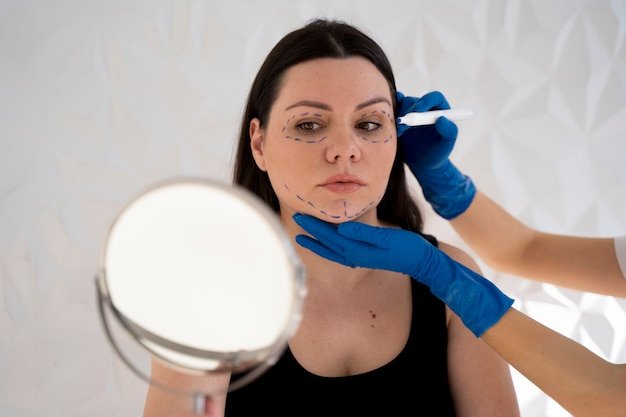Introduction
Acne treatment in Abu Dhabi is one of the most prevalent skin conditions affecting individuals of all ages, particularly adolescents and young adults. It can have significant effects on a person’s mental health and self-esteem, making effective treatment crucial. In Abu Dhabi, there is a wealth of advanced treatment options available for those seeking relief from acne.
Understanding Acne
Acne is characterized by the presence of pimples, blackheads, and cysts that can occur on the face, back, and shoulders. It is caused by a combination of factors, including excess oil production, clogged pores, bacteria, and hormonal changes. Understanding the types of acne—such as inflammatory acne (pustules and cysts) and non-inflammatory acne (blackheads and whiteheads)—is essential for choosing the right treatment.

Why Seek Treatment in Abu Dhabi?
Abu Dhabi is home to numerous advanced skincare clinics and dermatology practices staffed by experienced professionals. These clinics offer state-of-the-art technology and treatments tailored to individual needs, making the city a prime location for effective acne management.
Top Acne Treatment Options in Abu Dhabi
Several treatment options are available in Abu Dhabi, each designed to target acne from different angles:
- Topical Treatments:
- Retinoids: Derived from vitamin A, retinoids help unclog pores and reduce inflammation.
- Benzoyl Peroxide: This ingredient kills bacteria and reduces oil production, making it effective for treating mild to moderate acne.
- Oral Medications:
- Antibiotics: Prescribed to reduce bacteria and inflammation, antibiotics can be effective for more severe acne.
- Hormonal Treatments: For women, hormonal therapies can help regulate menstrual cycles and reduce hormonal acne.
- Laser Treatments:
- Various laser therapies, such as blue light therapy and fractional lasers, target acne lesions and can improve skin texture.
- Chemical Peels:
- Chemical peels use acids to exfoliate the skin and remove dead cells, reducing acne and improving skin clarity.
- Microdermabrasion:
- This non-invasive procedure exfoliates the outer layer of skin, promoting new skin growth and reducing the appearance of acne scars.
Combination Treatments
Many dermatologists recommend a combination of treatments for optimal results. This approach allows for personalized treatment plans tailored to an individual’s specific acne type and skin condition, increasing the chances of success.
Choosing the Right Clinic
When selecting a clinic in Abu Dhabi, consider factors such as the clinic’s reputation, the expertise of the dermatologists, and patient reviews. A thorough evaluation of the clinic’s services and success stories can guide you toward making an informed decision.
Consultation Process
During your first visit to a dermatologist, you can expect a comprehensive skin assessment. The doctor will inquire about your medical history, lifestyle, and previous treatments. This initial consultation is crucial for developing a personalized treatment plan tailored to your unique needs.
Cost of Acne Treatments in Abu Dhabi
The cost of acne treatments can vary significantly based on the type of treatment and the clinic’s pricing structure.It’s essential to compare these costs with other regions to ensure you receive competitive pricing.
Common Myths About Acne Treatment
Several misconceptions about acne treatment can lead to ineffective practices. For instance, some believe that sun exposure can clear acne, which is false; in reality, excessive sun exposure can worsen skin issues. Understanding the facts about acne treatment helps individuals make informed decisions.
Long-Term Management of Acne
Acne is often a chronic condition requiring long-term management. Continuous care, regular dermatologist visits, and monitoring progress are vital for maintaining clear skin. Adjusting treatment plans based on skin response is essential for effective long-term results.
Conclusion
Abu Dhabi offers a wide array of acne treatment options, from topical treatments and oral medications to advanced procedures like lasers and chemical peels. The key to successfully managing acne lies in seeking professional help, establishing a personalized treatment plan, and maintaining a consistent skincare routine. If you’re struggling with acne, don’t hesitate to consult with a qualified dermatologist in Abu Dhabi to explore the options that are best for you.
Frequently Asked Questions (FAQs) About Acne Treatment Options in Abu Dhabi
1. What causes acne?
Acne is caused by a combination of factors, including excess oil production, clogged pores, bacteria, hormonal changes, and inflammation. Lifestyle factors, such as diet and stress, can also contribute to its development.
2. At what age does acne typically occur?
Acne commonly appears during puberty, around ages 12 to 15, but it can affect individuals of all ages, including adults in their 20s and 30s. Hormonal fluctuations, such as those related to menstruation or pregnancy, can trigger acne in adult women.
3. How long does it take to see results from acne treatments?
The time it takes to see improvement varies depending on the treatment method. Some topical treatments may show results within a few weeks, while oral medications or more intensive treatments like lasers or chemical peels may take several weeks to a few months for noticeable improvement.
4. Are acne treatments safe?
Most acne treatments, when prescribed and monitored by a qualified dermatologist, are safe. However, some treatments may cause side effects. It’s important to discuss any concerns with your dermatologist during the consultation.
